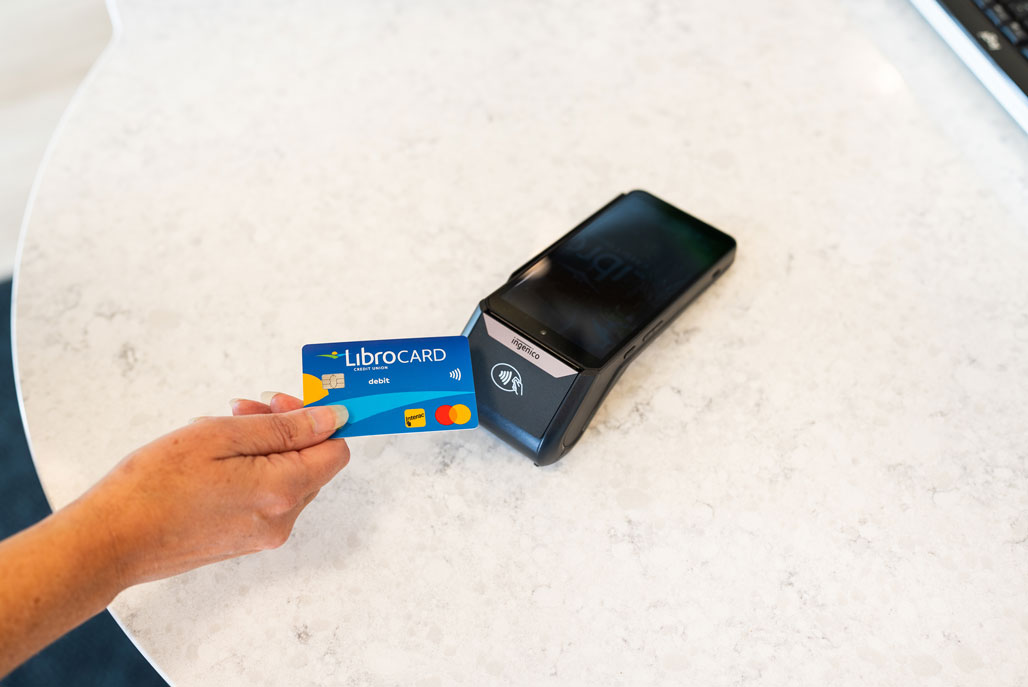Fraud Prevention
Scammers are sneaky and sly. They can target anyone, from youngsters to retirees. They can also target businesses. No one is immune to fraud. To learn more about some common and modern scams and how to be vigilant, check out the information below!

Ensuring your safety
At Libro, your security is one of our top priorities. Learn more below about how Libro is is protecting you from fraud.
This is a great time to ensure your contact information is up to date. You can make updates in your online banking , call Libro Connect, or book a meeting with your Libro Coach.
Let’s bust the myth on Flash
Myth 1
Electronic Pickpocketer can steal my card info when they walk by
FALSE: Security technology prevents electronic pickpocketing using a multi-step verification process during data transfer
Myth 2
If I stand too close to the machine a flash transaction will occur through my wallet
FALSE: Flash Card must be 4 centimetres away from a terminal and positioned at a certain angle to complete purchase
Myth 3
If card is lost or stolen my account could be empty quickly before I know it.
FALSE: Low transaction limits are in place to protect you from high volume or value of transactions clearing your account
Frequently Asked Questions
Dating and Romance Scams
What is it?
Romance scams typically start online, commonly on dating sites but can also originate on other types of sites or social media. Fraudsters will work to develop a relationship or close friendship with the victim. At some point in the relationship there is a request for money, and this can be for various reasons. Fraudsters will push the need for the victim to send funds, even ask the victim to use LOC, retirement funds or take out loans. Fraudsters will always have an explanation and often instruct victim to not speak with their financial institution or tell them why funds are being sent. Fraudsters may also send funds in the form of cheque or request online banking password to deposit funds via remote deposit capture.
Red Flags:
- Quick affection and large number of compliments and requests to meet.
- Communication quickly moves off dating site to email and text messages.
- Receive a request to send money; financial troubles, lost documents and need money to replace them, want to come visit and need money for travel, need help with a business expense.
How to Protect Yourself:
- Do not send money to someone you have not met in person.
- Do not share your financial information or online banking information.
- Ensure the site you are using is legitimate (i.e Dating Site).
- Be suspicious of anyone that develops deep feelings quickly.
- Ask lots of questions.
- Contact Libro before sending money.
Phishing and Smishing Scams
What is it?
Victims are referred by email, text or online message to a fraudulent website or automated phone system disguising as a financial institution or other reputable company. Request is made to enter personal information, account numbers, user names, passwords or credit card information (including the three-digit security number on the back). Unfortunately the victims compromise the very information the scammers claim they will protect.
Red Flags:
- Unexpected email, text or social media message is received encouraging recipient to click on link or attachment.
- Message calls for immediate action; may claim accounts have been compromised or become inactive.
- Social media posts may encourage recipient to view a new video or website.
How to Protect Yourself:
- Always contact sender through known contact information to confirm request. Ensure that the attachment or link is valid prior to opening.
- If information is provided, notify Libro and credit card company.
- If personal information is provided contact Equifax and TransUnion to add an alert to your credit report.
- Report to police and the Canadian Anti-Fraud Centre.
- Have your computer serviced to ensure security.
- Change passwords from a secured device.
Tax Scams
What is it?
Victims receive a phone call claiming a debt is owed to the government and immediate payment is required via gift cards, wire transfer, e-transfer, Western Union Transfer or bitcoin deposit machine. Often a threat of arrest is made if payment is not complete.
Red Flags:
- Receive a call from CRA.
- Caller is threatening if immediate action is not taken i.e. police action.
- Request to make payment via gift cards, wire, e-transfer,
- Western Union Transfer or bitcoin deposit machine.
- Told not to tell anyone why money is being sent.
How to Protect Yourself:
- Hang up immediately.
- Contact CRA using phone number available on website or in phone book if confirmation is needed that no funds are owed.
- If funds are provided, contact your Libro branch.
- Report to police and the Canadian Anti-Fraud Centre.
Emergency Scams (Grandparent Scam)
What is it?
Individual receives phone call from someone pretending to be their family member or someone calling on their behalf. Caller claims to need money because they are in trouble, lost documents while traveling or in need of medical attention.
Red Flags:
- Call received in the night.
- Caller needs money ASAP due to an emergency.
- Request is made not to tell anyone.
- Caller does not sound like family member or use same language.
How to Protect Yourself:
- Do not disclose name of grandchildren, ask who is calling or who they are calling for.
- Hang up.
- If you feel the call is real, contact other family member or call the location place they state to be directly i.e. hospital.
- Contact Libro before sending money.
- If funds are provided, contact your Libro branch.
- Report to police and the Canadian Anti-Fraud Centre.
Click here to view a video on Emergency Scams (Grandparent Scam).
Sale of Merchandise
What is it?
Victim selling item and receives counterfeit or charge back payment after giving item to purchaser. Alternatively, victim is provided with payment larger then asking price via cheque or wire and is instructed to return the difference to purchaser, after difference is provided the payment is discovered to be fraudulent.
Victim purchasing item provide payment for an item that is never received or payment information believed to be provided on a secure site is stolen and used for fraudulent purchases.
Red Flags:
- Refusal to purchase with cash.
- Payment provided is more than the requested amount.
- Request to send funds before picking up the items.
- Sent a link to a website to make payment.
How to Protect Yourself:
- Only accept cash when selling item to an unknown individual.
- Do not accept payment for more than the agreed upon price.
- Do not send money to individual prior to receiving an item.
- Meet in person.
- Use only reputable sites when making online purchase.
- Contact Libro before sending money.
- If funds are provided, contact Libro.
- Report to police and the Canadian Anti-Fraud Centre.
- Report to site used for sale/purchase of item.
Employment Scams
What is it?
Victims are successful at obtaining job online and provided payment to purchase items as a secret shopper or for supplies, request made to send a portion of the funds back to sender or to another individual. After funds are sent payment is discovered to be fraudulent. Alternative a request for online banking information is made and once provided account is used for fraudulent online banking transactions.
Red Flags:
Obtained job quickly with little contact with employer.
High pay offered with little effort needed.
Request to send funds to individual once received i.e. send Western Union or Money Gram.
How to Protect Yourself:
- Research company to confirm they are legitimate.
- Never provide online banking passwords, change password if provided.
- Contact Libro before receiving or sending money.
- If funds are provided, contact Libro.
- Report to police and Canadian Anti-Fraud Centre.
Online Banking Scams
What is it?
Involves fraudsters obtaining an individual’s information and using it to log into their online banking profile. They then complete online banking activities using the individual’s account. These activities could include but are not limited to; email money transfers, Western Union Money Transfers, Interac online payments and bill payments. Fraudsters use several techniques to obtain individual’s information; watching over someone’s shoulder, Phishing emails, text messages or social media messages, virus attack.
Red Flags:
- Received online banking alert from Libro for activity you do not do.
- Noticed unauthorized activity on account when reviewing online banking or account statement.
- Provided online banking information to an individual or website.
- You have recently clicked on a link or attachment you were not expecting.
How to Protect Yourself:
- Set-up Libro’s account alerts to assist in active account monitoring.
- Never share online banking passwords.
- Be aware of others around you when entering online banking passwords.
- Do not open unexpected email/text/social media attachments or links.
- Only use reputable apps provided by Apple Store or Google Play.
- Use caution where you are storing your backup information to, needs to be secured. Desktop/laptop is not a secured location.
- Watch the permission requests made by apps to manage phone.
- Contact Libro if concerned online banking may be at risk or to report unauthorized activity.
- Have computer service to confirm it is secure.
- Report to police and Canadian Anti-Fraud Centre.

 />
/>

 />
/>

 />
/>